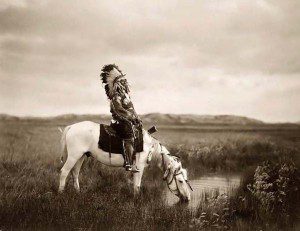19th May 2015
By Steve Taylor Ph.D
Guest writer for Wake Up World
What We Can Learn from Native Americans’ Attitude to Nature?
I’ve just been reading a fantastic book called Touch the Earth – originally published in 1971 – which is a collection of statements and writings by native Americans, from the 17th century onwards. One of the most striking things about the book is the great gulf that seems to lie between the native- and European-Americans. The two peoples seem to have different ways of relating to the world, which aren’t just the result of different cultures and traditions, but of fundamental psychological differences.
This manifests itself most strongly in the two peoples’ attitude to nature. Many of the statements in the book express bemusement and anger at the ‘white man’s’ lack of respect for nature. The Native Americans clearly felt a powerful connection to their land, and to all natural phenomena. They felt a sense of sacredness in their interactions with nature. Speaking of the Lakota, Chief Luther Standing Bear – one of the most acute observes of the differences between Native Americans and Europeans – wrote, ‘He loved the earth and all things of the earth… Kinship with all creatures of the earth, soil and water was a real and active principle.’ In Touch the Earth, one of the Dakota describes how ‘in the course of the daily hunt, the red hunter pauses for an instant in an attitude of worship… [whenever] they come upon a scene that is strikingly beautiful or sublime.’ As a result, the Dakota ‘see no need for setting part one day in seven as a holy day, since to him all days are God’s.’
The Native Americans reported their horror at the white man’s exploitative attitude to the land, their determination to tear up the surface of the earth to piece in their search for resources and wealth. Again and again at treaty meetings, the Native Americans express their dismay at the concept that land can be divided up and sold as a commodity. To them, the land was too sacred for human beings to claim ownership of. As Chief Joseph of the ‘Nez Perce’ tribe stated,
‘The country was made without lines of demarcation and it is no man’s business to divide it… The only one who has right to dispose of [the land] is the one who has created it.’
The ‘Individuated’ Sense of Self
If there is one fundamental psychological difference which between the Native Americans and the European-Americans, it may be that European-Americans have a more ‘individuated’ sense of self. That is, the European-American (or modern American, or modern Western) sense of self appears to be more autonomous, with a stronger sense of boundary, than the traditional Natives of Touch the Earth. This modern sense of self experiences a degree of separateness – separateness to the natural world, separateness to each other as individuals, and even separateness to their own bodies (in the sense of experiencing ourselves as an ‘I’ which inhabits a body).
In fact, many anthropologists have suggested something similar of other indigenous peoples. For example, the early 20th century anthropologist Lucien Levy-Bruhl, described the essential characteristic of the indigenous tribal peoples he studied as their less ‘sharpened’ sense of individuality. He noted that, rather than existing as self-sufficient individual entities, indigenous peoples’ sense of identity was bound up with their community. He cited reports of tribal peoples who use the word ‘I’ when speaking of their group, and also noted that indigenous peoples’ sense of identity extends to objects they use and touch.
A strongly ‘individuated’ sense of self may have some benefits. It may give us a sense of control over our own lives, a sense of being directors of our own destiny rather than being confined by traditions and conventions. It may even have helped to generate some of the technological advances which have made the modern world a comfortable and entertaining place for many of us. However, the potential dangers of this separate self are massive. For us as individuals, it may lead to a sense of dislocation, an underlying sense of not being at home in the world (which would have been completely foreign to the Native Americans). And this sense of unease may manifest itself in conflict between us, as individuals and groups. As one of the speakers says in Touch the Earth, the Native Americans ‘knew that man’s heart away from nature becomes hard; he knew that the lack of respect for growing, living things soon led to lack of respect for humans too.’
Ultimately, the greatest danger of our sense of separation may be the destruction of our environment. People who see themselves as separate from nature and don’t perceive it as sacred – people who feel that they are entitled to dominate nature, and to plunder its resources for their own use – will inevitably mistreat and over-exploit the natural world. They will eventually reach a point of damaging the environment to the extent that it is no longer able to support them. This is why it’s urgent for us to overcome our sense of separation and to re-connect with the natural world, to develop reverence for it and sense its sacredness, as the Native Americans did. Our survival may depend on it.
Previous articles by Steve Taylor:
- Transcending Time in Egoless States of Consciousness
- Transcendent Sexuality — How Sex Can Generate Higher States of Consciousness
- Reclaiming The Self – Is Your Sense Of Self An Illusion?
- The Power Of Silence
- Happiness Comes from Giving and Helping, Not Buying and Having
- A Sense of Purpose Means a Longer Life
- Empathy – The Power of Connection
- Transcending Human Madness
- If Women Ruled the World – Is a Matriarchal Society the Solution?
- Transpersonal Purpose and the Impulse for Spiritual Development
About the author:
Steve Taylor holds a Ph.D in Transpersonal Psychology and is a senior lecturer in Psychology at Leeds Metropolitan University, UK. For the last three years Steve has been included in Mind, Body, Spirit magazine’s list of the ‘100 most spiritually influential living people’ (coming in at #31 in 2014).
Steve is also the author of Back to Sanity: Healing the Madness of Our Minds and The Fall: The Insanity of the Ego in Human History and the Dawning of A New Era. His books have been published in 16 languages and his research has appeared in The Journal of Transpersonal Psychology, The Journal of Consciousness Studies, The Transpersonal Psychology Review, The International Journal of Transpersonal Studies, as well as the popular media in the UK, including on BBC World TV, The Guardian, and The Independent.
Connect with Steve at StevenMTaylor.com or follow Steve at Facebook.com/SteveTaylorAuthor.
Source Article from http://wakeup-world.com/2015/05/19/touching-the-earth-again/
Views: 0
 RSS Feed
RSS Feed

















 May 18th, 2015
May 18th, 2015  FAKE NEWS for the Zionist agenda
FAKE NEWS for the Zionist agenda 

 Posted in
Posted in  Tags:
Tags: 
















